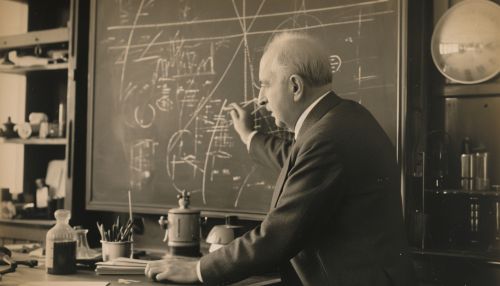George Dantzig
Early Life and Education
George Bernard Dantzig was born on November 8, 1914, in Portland, Oregon. His parents were Tobias Dantzig, a mathematician and linguist, and Anja Dantzig, a linguist. The family moved to Washington, D.C. when George was a child, and he grew up in a bilingual household, speaking both English and Russian.
Dantzig attended Powell Junior High School and Central High School in Washington, D.C. He showed an early aptitude for mathematics and was encouraged by his father to pursue the subject. After high school, he attended the University of Maryland, where he earned a Bachelor of Arts in Mathematics and Physics in 1936.


Following his undergraduate studies, Dantzig moved to the University of Michigan for his graduate studies, where he earned a Master's degree in Mathematics in 1938. He then moved to the University of California, Berkeley, where he began his doctoral studies under the supervision of Jerzy Neyman.
Career and Contributions to Mathematics
In 1941, Dantzig was appointed as an assistant professor in the mathematics department at the University of California, Berkeley. However, his academic career was interrupted by the outbreak of World War II. He joined the U.S. Air Force, where he worked on the development of the linear programming method for planning and decision-making.
After the war, Dantzig returned to Berkeley and completed his Ph.D. in Mathematics in 1946. His dissertation, titled "The General Linear Programming Problem," laid the foundation for his future work in this field. He then joined the RAND Corporation, where he continued his research on linear programming and developed the Simplex algorithm, a method for solving linear programming problems.
In 1960, Dantzig returned to academia as a professor of operations research and computer science at the Stanford University. He continued his research on optimization and decision-making, and his work had a significant impact on fields as diverse as economics, engineering, and computer science.
Dantzig retired from Stanford in 1985 but remained active in the field of mathematics. He continued to publish research papers and books, and he received numerous awards and honors for his contributions to the field of mathematics.
Legacy
George Dantzig's work on linear programming and the Simplex algorithm has had a profound impact on the field of mathematics and beyond. His methods are widely used in economics, engineering, computer science, and many other fields. His work has also influenced the development of other mathematical methods and theories, such as the Dantzig-Wolfe decomposition and the Dantzig selector.
Dantzig passed away on May 13, 2005, but his legacy lives on. His contributions to the field of mathematics continue to be recognized and celebrated, and his methods continue to be widely used in research and industry.
